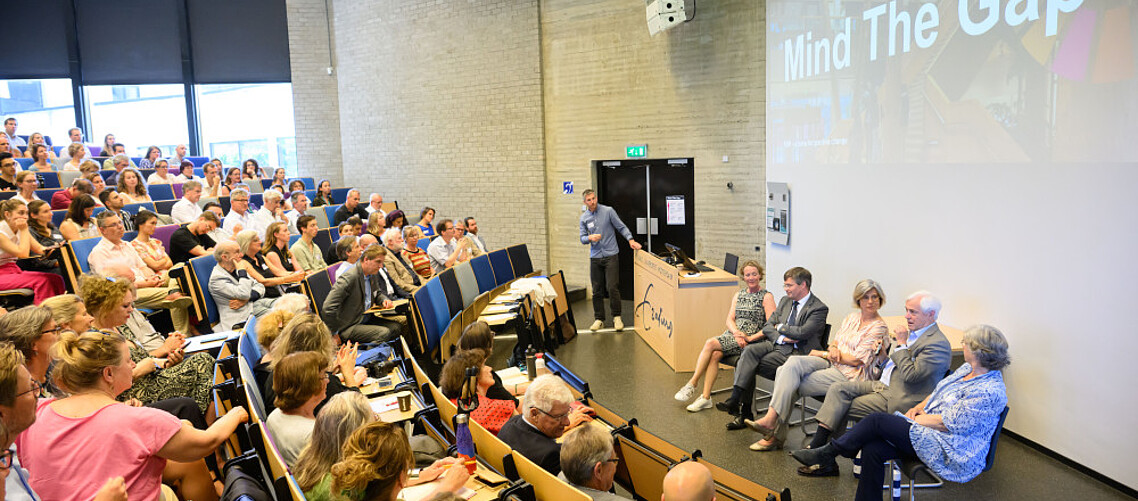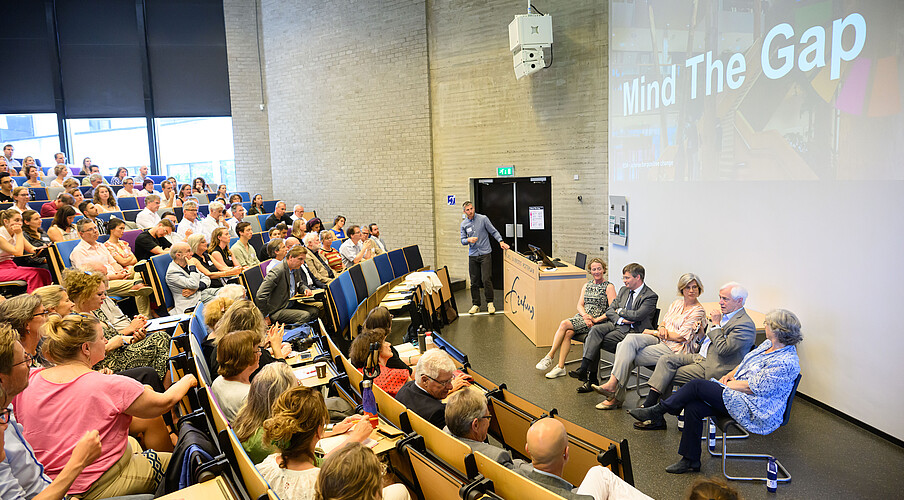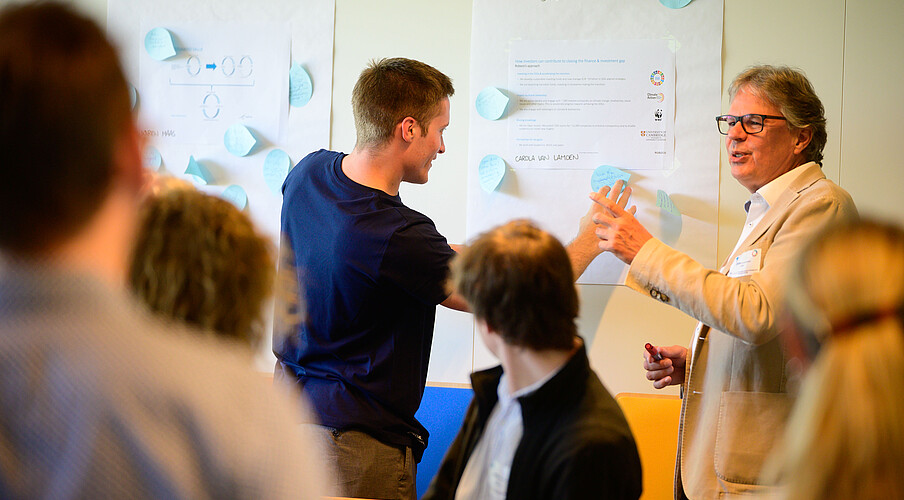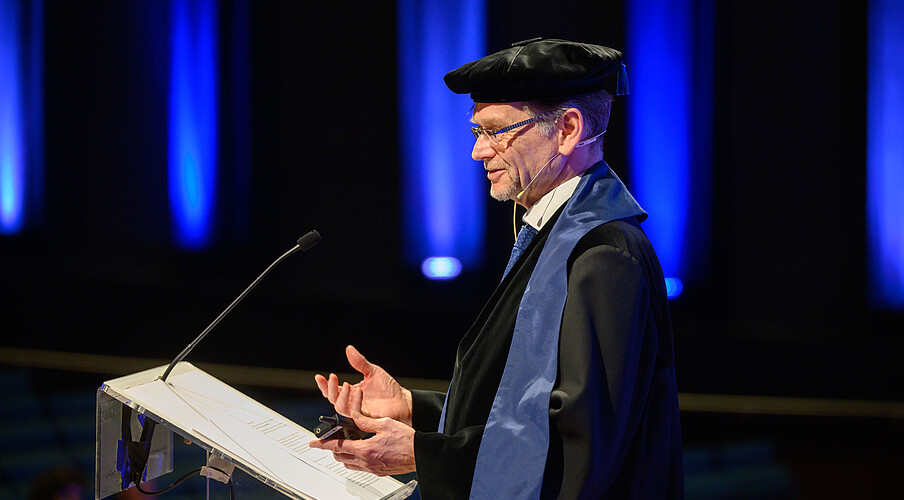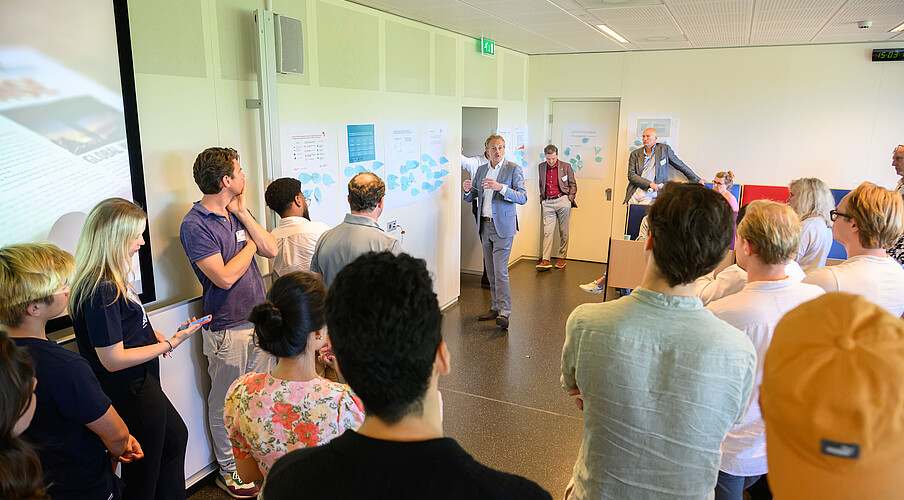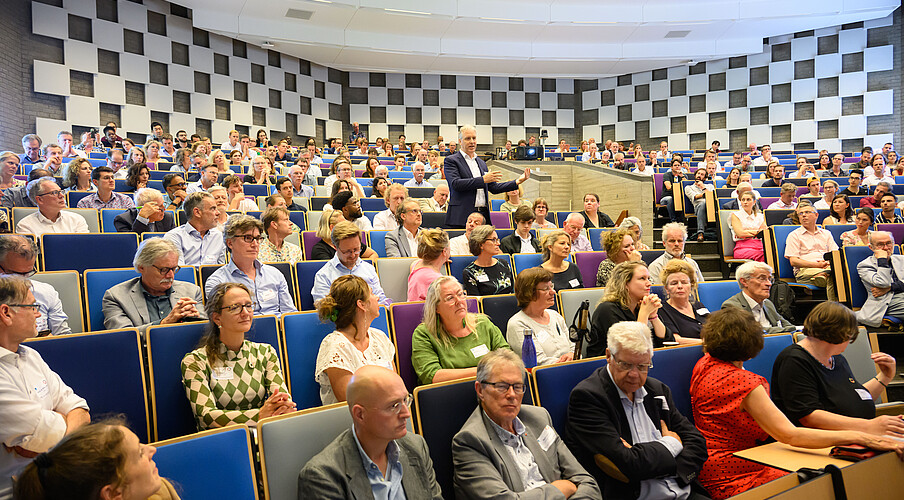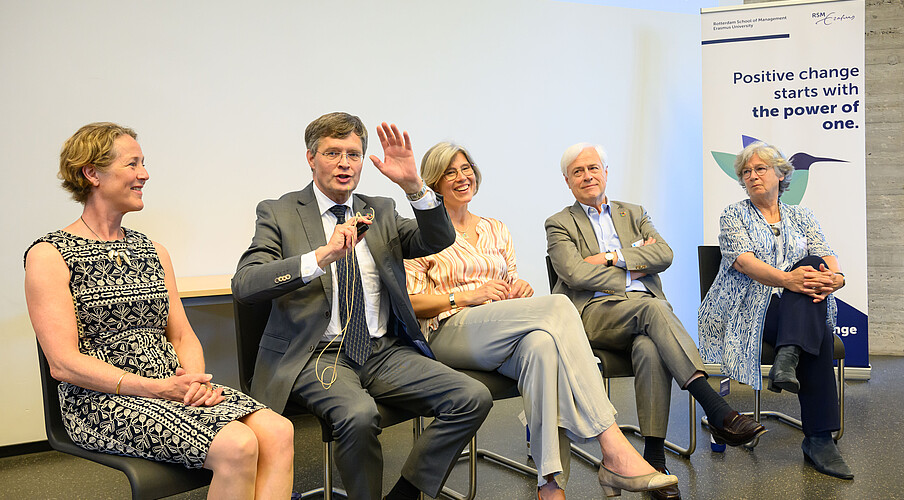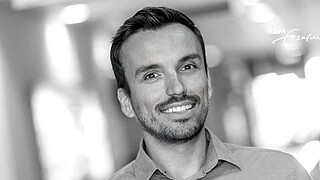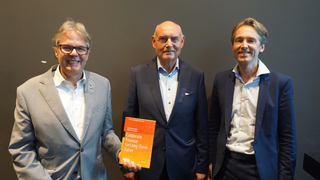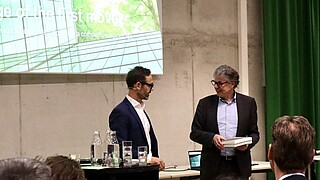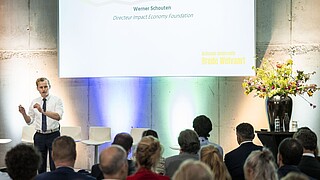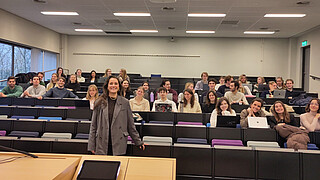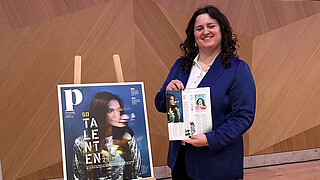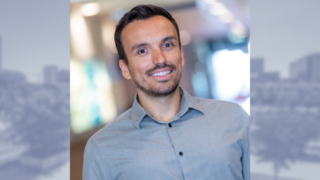Eva Rood, director of RSM’s Positive Change Initiative, introduced the event by stressing the importance of keeping hope, and of sharing, learning, and of partnerships. She encouraged the audience to share their knowledge and insights in the breakout sessions that addressed seven gaps between the current situation and attaining the SDGs by 2030.
Why are we off track?
The discussions by the audience – comprising professionals from profit and not-for-profit organisations, civil society organisations, foundations and networks – addressed the barriers that have kept efforts off track and prevented the attainment of the SDGs so far. These include geopolitical and global developments; Covid-19; problems that have become more complex; the fear of working in true partnerships; and the need for a paradigm shift; for true citizen participation; and for engaged research.
Each of the seven breakout sessions was tasked to find specific actions to address gaps in strategy, finance and investment, governance, leadership, data, innovation, and skills. In summary, they concluded that approaches towards a solution would need to take a multi-actor approach, and the right measurement methods that stimulate long-term actions.
The role of business schools
At the end of the afternoon, Professor Rob van Tulder’s valedictory lecture reflected back on his 28 years at RSM, of which 26 were as a co-founder of the Department of Business-Society Management. In his lecture, titled Navigating Positive Change in times of societal crises: What role for Business Schools? Prof. Van Tulder explained the need for such a department in a business school, shared some of the many projects in which he had been involved, the initiatives he launched, and books that he has written.
He described the development of first a personal responsibility to an increasingly adopted attitude in corporate business to the level of corporate societal and sustainable responsibility that we see now via three levels of analysis – the global, national, and organisational levels, and three ‘tides’ of thinking between 1996 – 2024 that included globalisation, and the development of the subject of business-society management within Corporate Social Responsibility (CSR).
He spoke of Erasmus University Rotterdam making a fundamental choice and commitment for its societal position to mainstream sustainable business, and of bringing society onto the campus for students and for academics.
What’s needed now
Making a conclusion for the challenges of implementing actions towards the SDGs, he said business-society interactions and engaged scholarship are needed now more than ever. Engaged scholarship adds collective value to society and stimulates positive change by focusing on today’s ‘grand challenges’ through challenged-based learning and action research. Universities are a ‘safe space’ for constructive debate.
Prof. Van Tulder was congratulated by several colleagues including Prof. Lucas Meijs and some of his many PhD students, and by the chair of SDG Nederland and frontrunner in ESG-banking Herman Mulder, and former prime minister and chair of the Dutch Sustainable Growth Coalition Jan Peter Balkenende.
Brainstorming the gaps
Seven breakout sessions, each of around 40 people, spent 90 minutes sharing their knowledge and expertise to produce strategies for closing the gaps towards achieving the SDGs.
1. The Strategy Gap
Moderator Prof. Rob Zuidwijk, Professor of Global Supply Chains and Ports at RSM started with the example of the freight sector, which produces 11 per cent of all greenhouse gas emissions and container freight grows at 3 per cent per year. It’s one of the sectors that’s perceived as difficult to abate. Suggestions for addressing the Strategy Gapfrom this session included business schools contributing to a paradigm change to make profit an ‘inclusive concept’. Mainstream business is not fit to realise the UN’s SDGs so non-linear business innovation is needed, requiring encouraging creativity and radical innovation in business models, and focusing on educating new generations of business students about sustainable strategy.
2. The Finance and Investment Gap
Moderator Prof. Dirk Schoenmaker opened the session on the Finance and Investment Gap: “Finance works for finance, and that needs to change,” he said. The financial system is six or seven times bigger than the economy, and money is being sent into the old economy – which is profitable but unsustainable.
Panellists talked of reducing CO2 emissions before 2030 with a tax to drive businesses towards serious change without considerable costs for regular consumers; addressing the root causes of financial exclusion for the 1.4 billion people that don’t have access to finance; introducing and scaling up impact accounting, and active ownership of companies to accelerate the road to net zero.
A final thought for this breakout session was about the Inner Development Goals, 5 dimensions with 23 skills of human inner growth and development, continuing to have open conversations with people with other perspectives and views.
3. The Governance Gap
This passionate discussion about the Governance Gap covered the role of corporate governance, the involvement of stakeholders, and the idea of ecosystems and partnerships, with an opinion that the system right now is broken, and the rationale of self-interest needs to be changed. Suggestions included regulation that forces action and incentives to hold firms accountable, like the Corporate Sustainability Reporting Directive which began in January 2023, and collaborations and ecosystem partnerships that combine technological readiness with knowledge, attitude and behaviour. Compliance-driven legalities of governance should be properly implemented and focused on impact – and based on best practices.
Suggested actions that could be added were: addressing the ‘convenience gap’ such as, being able to buy second hand furniture in shops like Ikea, or organising volunteers to repair furniture; transdisciplinary collaboration systems and involving the government; and perhaps requiring every retailer to dedicate a percentage of their stores to repair services.
The role of business schools here is to effectively represent social interests and institutions while being able to develop arguments in a hostile environment. Reforming corporate governance should take the route of getting the whole market to the level of best practices instead of developing high expectations that no firm will ever meet. A missing key issue is how to efficiently involve and convince civil society, and how to involve government, the private sector, academia and science as well as civil society. This requires not only talking, but also listening.
4. The Leadership Gap
The warm atmosphere in the session about the Leadership Gap encouraged people to participate actively and sometimes emotionally, and to challenge others, provide feedback, and share their experiences. Thoughts included the need for more generalist leaders that understand the complexity of what the world needs, despite there being many specialists as leaders. Companies can educate, reward, and select for effective leaders that don’t make the decisions themselves, but make sure that certain decisions are taken. To change culture smoothly, leaders need to create conditions in the background that lead and influence.
Other issues discussed included leaders losing their focus on the SDGs, loneliness in the boardroom, and the ESG war, and how leadership is easy in easy times but hard during hard times. And of the ‘addiction to actions’, sometimes what’s needed is to slow down, and have the wisdom to think and take time to reorganise. Company strategies most definitely have a role in transformative change.
5. The Data Gap
The panel was asked plenty of questions about a wide range of Data Gap topics. The discussion covered the challenge of maintaining an independent, publicly available database for living wage data across 166 countries, and to balance the accessibility of data as a 'global public good' while it’s still vulnerable to scraping and use in AI tools. Ensuring continued support for data collection, calculation, and updating is a solution, after establishing a non-debatable definition of 'decent life'.
Data can be used to understand and address global issues like inflation, poverty, and climate change, and this highlights the lack of a clear plan to combat climate change despite public belief in shared responsibility. Micro-level data on consumer behaviour could help achieve the goals.
Other subjects discussed included closing manufacturing loops to manage e-waste and maintain the value of raw materials, and extending the responsibility of producers for electrical and electronic equipment waste to help close the gap in e-waste recycling rates.
The role of business schools is to remain open to collaboration with stakeholders (external, students, and faculty), and at RSM, for the Erasmus Centre for Data Analytics Data Collaboratory to work on SDG challenges with real datasets in hackathons and immersive experiences while creating awareness with students to teach more of them the data skills that can lead to substantial improvements
6. The Innovation Gap
This discussion of the Innovation Gap started with a big issue for Rotterdam; the port industry, where the two big issues are CO2 reduction and circular production. To achieve climate neutrality requires huge innovation but this needs an innovative business case to remain profitable. The panel discussed looking for collaborations in places that are less logical at first sight, and to not wait for government legislation before organising and directing change.
The concept of frugal innovation – promoted by the International Centre for Frugal Innovation among others – espouses innovating for the bottom 40 per cent of society and reducing the amount of manufacturing, and reducing costs for more affordable innovation. Much of the frugal innovation already going on is ‘under the radar’ though.
The discussion continued to cover the steel industry, healthcare, patient data, the Labour Gap and human rights, and how ‘routine work’ is diametrically opposed to innovation because it does not recognise or solve old problems or recognise new ones. A contributor said that the problem is not that old people are not good at learning new things, but that old people are in jobs where there is nothing to learn.
7. The Skills Gap
Engaging presentations meant lots of participants contributed and took notes through the breakout session for the Skills Gap. They heard that preparing students of the future means giving them new skills but 103 million people still have no access even to basic literacy, so thinking needs to go beyond business schools and back to basics, connecting skills practice and theory with challenge-based learning so students can work with all the SDGs. The long-term vision is that if everything in society changes, education cannot remain the same, yet education has not changed much over the past century. It requires school boards, managers, and government to lead the change, and for collaboration between business, government, and education.
Developing ‘SDG professionals’ could benefit the public and private sectors, for example business students working on a public problem for the municipality which would enable students to become orientated and give the public sector help in approaching problems in a holistic manner. Instead of business cases, add value cases to the curriculum, and a crucial skill is listening to people on the ground to understand the real problem and avoid de-contextualisation and dehumanization of social issues in education.
The Positive Change Initiative at RSM intends to publish a fuller report of the Mind The Gap conference soon.
